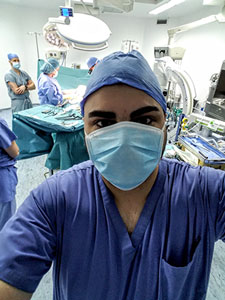 “The kids.”
“The kids.”
That is what Mahmoud Toumeh remembers most about his medical mission trip to care for refugees in Jordan.
“Some were so traumatized they won’t eat or play,” recalls Toumeh of his 10-day volunteer experience last year.
As a master of public health student at NDSU, Mahmoud wants to make a difference in the world. The trip organized through the Syrian American Medical Society helped Syrian refugees who fled into neighboring Jordan.
The trip was gratifying, but much tougher than anything he’s experienced in his work as a certified nursing assistant and unit clerk on the surgery floor at Fargo’s Sanford Health.
Toumeh is a U.S. citizen. His family immigrated to the U.S. from Syria and his father took a job as a physician in Fargo. Toumeh lost his maternal grandfather in Syria, due to a mortar strike.
What happened informs his decisions today. Toumeh earlier earned a bachelor’s degree in biology with an emphasis on health and medical sciences.
The impact of his family’s experience led him to NDSU’s Master of Public Health program, where he is specializing in management of infectious diseases.
“Public health is larger,” Toumeh said. “The amount of impact one person can have is massive. In the end, I want to do something meaningful.”
The trip to Jordan was risky, but the decision to go was easy, Toumeh said. Making it easier was the group of U.S. doctors and nurses who all volunteered. They split into six teams and went to different locations each day.
Toumeh’s first day was at a remote clinic on the Jordanian/Syrian border. The 15-hour-shift started at 6 a.m. He translated since he speaks fluent Arabic. Toumeh dispensed medications and took vital signs. He helped see patients every 10 minutes.
The second day was at the Zaatari refugee camp. Nearly 80,000 Syrian refugees crowd the two-square-mile postage stamp of land.
Toumeh helped see 60 kids in a makeshift clinic of just two chairs and a table. Patients had fevers and autism and genetic disorders. Much of Toumeh’s work was simply making the young patients comfortable. At other times, he would have to deliver very difficult news to parents.
The next three days were spent at a hospital in Amman, Jordan. Toumeh worked alongside a neurosurgeon from Baltimore who brought his entire staff with him to conduct approximately 25 surgeries. The team did everything from back disc removal to hernia repair.
A 21-year-old man suffered from a bullet lodged next to his C2 vertebra. The two-hour surgery was fraught with risk, but Toumeh breathed a sigh of relief when it was completed. The patient returned to the refugee camp to recover. Days later he demanded to meet the medical team that saved his life.
“It was the best experience of my career,” Toumeh said. “I saw miracles every day.”
Toumeh’s experience in pursuing his master of public health degree has included working with New Americans, teaching about vaccines and other public health topics.
NDSU’s Master of Public Health program includes more than 70 national practice and study abroad sites. It is 1 of only 3 programs in the U.S. that offers an infectious diseases in public health option. NDSU offers the only program in the U.S. with an American Indian Public Health option.
Twenty-five percent of MPH students learn through interactive video. On-campus and online students from North and South Dakota, Minnesota, Mississippi, Washington, New Jersey, North Carolina, Poland, Jordan, Kenya, Lebanon, Nepal and many more locations participate in the program.
The Master of Public Health program at NDSU is accredited by the Council on Education for Public Health.


